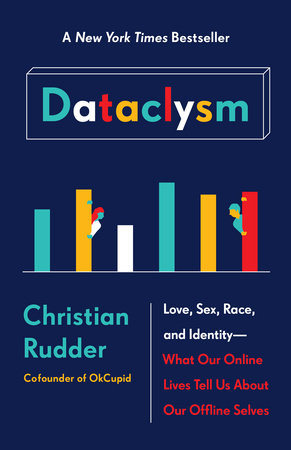
Dataclysm
Love, Sex, Race, and Identity--What Our Online Lives Tell Us about Our Offline Selves
کتاب های مرتبط
- اطلاعات
- نقد و بررسی
- دیدگاه کاربران
نقد و بررسی

August 15, 2014
Are you a racist? Plainer-looking than you might wish? Inclined to vote left? Big data knows-and it's talking. Big data is more than numbers; it's people. And it's from the way that people describe themselves that the manipulators of big data know how to sell them stuff, which would seem to be the object of the exercise. If you visit a dating website such as OkCupid-which Rudder founded after receiving a math degree at Harvard-and say of yourself, "loves to be outside," you're statistically unlikely to be anything other than a white woman; add "country girl," and the deal is sealed. The author looks at three big topics, often extrapolating from his own creation: "the data of people connecting," "the data of division" and the data concerning "the individual alone." What separates us is more interesting than what brings us together, and we're incredibly inventive at finding ways to divide ourselves: sex and gender, age, appearance, cultural background, religion, musical likes, food preferences and, most of all, race. It is on that last, thorny subject that Rudder's data becomes damningly meaningful: Americans are racist in ways that other nations are not, as measured simply by the exchange of flirtatious messages. The author is inclined to let the numbers speak for themselves without overlaying too much interpretation, though on race, he becomes impatient. We see things in aggregates and people as representatives of those aggregates, and "the patterns in the aggregate show that the dice, overall, are still loaded." Although he hopes for a democratization of data that might further a more civil society, Rudder allows that it's first-tier entities such as the National Security Agency and Facebook that are really in charge of the numbers, and it's not comforting to know that "what's being collected today is so deep it verges on bottomless." Demographers, entrepreneurs, students of history and sociology, and ordinary citizens alike will find plenty of provocations and, yes, much data in Rudder's well-argued, revealing pages.
COPYRIGHT(2014) Kirkus Reviews, ALL RIGHTS RESERVED.

Starred review from September 1, 2014
Rudder, cofounder of dating site OKCupid, offers an irreverent, thought-provoking popularization of data science, specifically online user data and what it tells us about attraction, division, and identity. Noting the dominant uses of data by corporations and government (marketing and surveillance), Rudder investigates and shares his enthusiasm for the human side of data. He mines his own site plus Twitter, Craigslist, Reddit, and Google among other sources to amass a huge data set and explain how this information can help us understand ourselves as humans. The author considers how changes in word frequency over time can signal cultural shifts, how racial and gender groups describe themselves using words not typically used by other groups, and how Twitter captures the immediate, authentic response to an event before reflection and media coverage interfere. VERDICT With a zest for both the profound and the wacky, Rudder demonstrates how the information we provide individually tells a vast deal about who we are collectively, from sex appeal to racial preferences on dating sites. A visually engaging read and a fascinating topic make this a great choice not just for followers of Nate Silver and fans of infographics, but for just about anyone who, by participating in online activity, has contributed to the data set.--Janet Ingraham Dwyer, State Lib. of Ohio, Columbus
Copyright 2014 Library Journal, LLC Used with permission.

September 1, 2014
Rudder, cofounder of dating site OKCupid, offers an irreverent, thought-provoking popularization of data science, specifically online user data and what it tells us about attraction, division, and identity. Noting the dominant uses of data by corporations and government (marketing and surveillance), Rudder investigates and shares his enthusiasm for the human side of data. He mines his own site plus Twitter, Craigslist, Reddit, and Google among other sources to amass a huge data set and explain how this information can help us understand ourselves as humans. The author considers how changes in word frequency over time can signal cultural shifts, how racial and gender groups describe themselves using words not typically used by other groups, and how Twitter captures the immediate, authentic response to an event before reflection and media coverage interfere. VERDICT With a zest for both the profound and the wacky, Rudder demonstrates how the information we provide individually tells a vast deal about who we are collectively, from sex appeal to racial preferences on dating sites. A visually engaging read and a fascinating topic make this a great choice not just for followers of Nate Silver and fans of infographics, but for just about anyone who, by participating in online activity, has contributed to the data set.--Janet Ingraham Dwyer, State Lib. of Ohio, Columbus
Copyright 2014 Library Journal, LLC Used with permission.

























دیدگاه کاربران